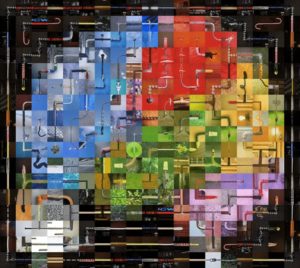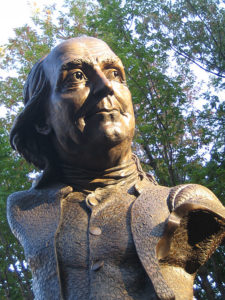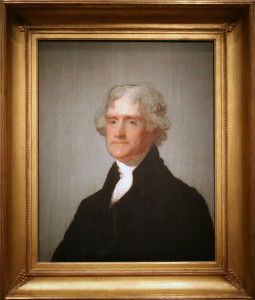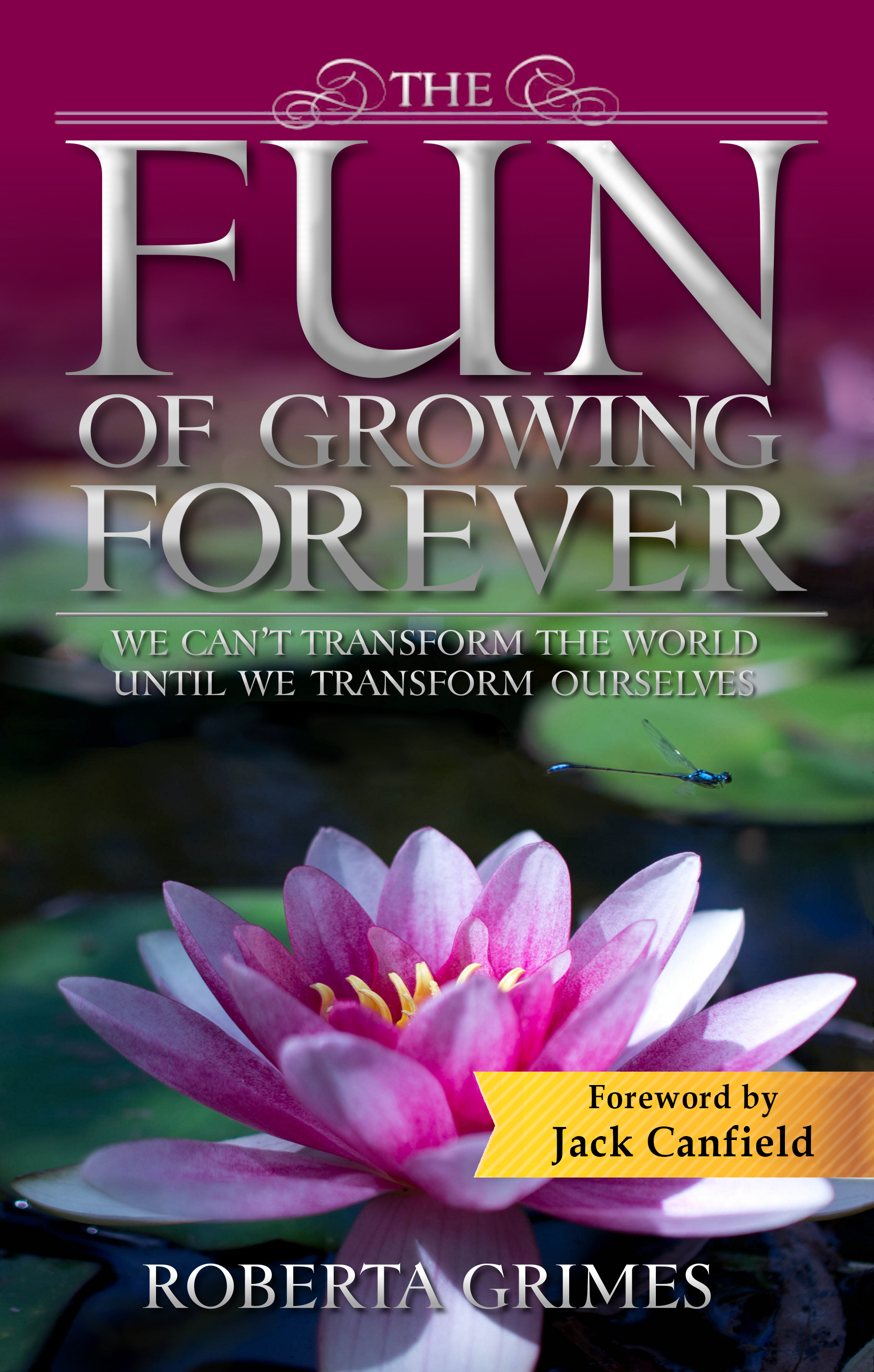 We enter these lifetimes on earth to experience negativity and learn how to rise above it so we can more effectively grow spiritually. Fear is the most negative emotion, so at our stage of development, growing spiritually means raising our personal consciousness vibrations away from fear and toward more perfect love. Since the base fear is the fear of death, the most effective thing we can do to improve the lot of humankind is to share with as many people as possible the certainty that human life is eternal. And every one of us is perfectly loved! I can recall when I was very small looking up and envisioning my great-grandparents sitting on the clouds, wearing wings and swinging their feet, looking down, so sad to be out of the action. What I didn’t realize until after I had done decades of research was that the people who have gone ahead of us are happier, busier, and much more alive than anyone on earth is now!
We enter these lifetimes on earth to experience negativity and learn how to rise above it so we can more effectively grow spiritually. Fear is the most negative emotion, so at our stage of development, growing spiritually means raising our personal consciousness vibrations away from fear and toward more perfect love. Since the base fear is the fear of death, the most effective thing we can do to improve the lot of humankind is to share with as many people as possible the certainty that human life is eternal. And every one of us is perfectly loved! I can recall when I was very small looking up and envisioning my great-grandparents sitting on the clouds, wearing wings and swinging their feet, looking down, so sad to be out of the action. What I didn’t realize until after I had done decades of research was that the people who have gone ahead of us are happier, busier, and much more alive than anyone on earth is now!
We have learned a great deal about the afterlife to which all of us will soon return. Every open-minded researcher of whom I am aware has reached essentially the same conclusions, and there are not at this point any more significant questions to be answered. Not only do we survive our deaths, but our lives once we have dropped our bodies turn out to be nothing but a glorious playtime! Last week we shared an overall view of what the afterlife is like in terms of physics, geography, and basic details. Now we are going to move into that world where love is the light and the air we breathe, where the weather is perfect and night never falls, where money and scarcity cannot exist, where travel and creation are largely by mind, and where the various kinds of fun to be had are limited just by our own imaginations.
 As we said last week, nearly everyone enters the afterlife at Level Three, which is the lowest of the beautiful Summerland levels. Level Three includes the family compounds where most of us reunite with loved ones, and it includes the great public buildings where many of us will have our life-review meetings. Level Three also includes hospitals, some of which look like traditional hospitals but most of which are open-air pavilions, beautiful retreats surrounded by flowers where we can receive whatever help we need to heal whatever damage we may have incurred in our lives just ended.
As we said last week, nearly everyone enters the afterlife at Level Three, which is the lowest of the beautiful Summerland levels. Level Three includes the family compounds where most of us reunite with loved ones, and it includes the great public buildings where many of us will have our life-review meetings. Level Three also includes hospitals, some of which look like traditional hospitals but most of which are open-air pavilions, beautiful retreats surrounded by flowers where we can receive whatever help we need to heal whatever damage we may have incurred in our lives just ended.
Those who begin their post-death lives in theses hospital oases of love-based care might have died of a long-term illness, in battle, under torture, or simply in the throes of some negative emotion. They might have been distorted by some cult or hardened by criminality; or for any reason, they might have been especially battered by their recent earth-lives. Whether we will need to do this sort of post-death recuperation and counseling is something our guides will decide for us, and while we are hospitalized this way we won’t be able to communicate with our loved ones on earth. Fortunately, though, outside of time our healing should take a few earth-months at most. And then, when we are fit and ready, we will embark upon the post-death events that those who hadn’t needed such help were able to begin as soon as they arrived.
Four things predictably happen for each of us quite soon after death. Their order might vary, but in general we will:
- Rejoin our greater minds. By most accounts this happens almost at once, and often even before we re-enter the Summerland. When we chose to enter this earth-life just ended, we stripped down to just a bit of our vast, eternal minds, a remnant designed for rapid spiritual learning. So we return home still living in our same old limited earth-minds and feeling confused about what is going on, being met by people who look familiar but not sure why that might be so. Then in an instant, our minds expand enormously! We are at once inconceivably brilliant, we recognize people we knew in other lives, and we remember where we are and so many details,
 so many people, just a dazzling mental expansion that puts us right back into this greater life that we had forgotten about altogether.
so many people, just a dazzling mental expansion that puts us right back into this greater life that we had forgotten about altogether. - Sleep. Even if we died without particular issues, many of us will fall asleep soon after we arrive. Then we will wake up raring to go, and never need to sleep again.
- Experience a life-review. Whether it happens in a public building or more intimately in our heavenly home, we will join with our spirit guides and perhaps with some who had shared this lifetime with us, and we will re-experience our whole earth-life just ended primarily from the viewpoint of those we affected. We will get to feel how we made other people feel. Those who have been through a life-review often say that it wasn’t so much the big things they did wrong that upset them to re-experience, since they had remembered and been prepared to face those big things. But rather, most of us undergoing a life-review are stunned to realize how many times we treated other people shabbily, we shamed an overweight classmate or disrespected a dignified older person, acted selfish and grabby, or simply ignored an easy chance to do some little kindness. Even with guides and loved ones to help us analyze the events of our lives just past, a life-review is always tough! Then once we have re-experienced the lifetime just ended from the viewpoint of everyone whose life we touched, we are asked to forgive them all. Believe it or not, that’s the easy part! We know now that none of it was real and everyone is fine, so of course we gladly forgive them all. Family murdered before our eyes? No problem! But then we are asked to forgive ourselves for the harm that we did to all these others, and many people have trouble with that. We find the way that we behaved so disappointing! Forgiving ourselves is essential, though, since otherwise our consciousness vibrations will gradually drop, and we could end up putting ourselves into the Outer Darkness levels. There is lots of counseling and help available, and those that we wronged in life are there hugging us, so
 fortunately most of us do manage to forgive ourselves. But it’s not easy. When I first understood that, believe me, I really cleaned up my act!
fortunately most of us do manage to forgive ourselves. But it’s not easy. When I first understood that, believe me, I really cleaned up my act! - Party hearty. Soon after we arrive, we are feted at a gala party. Although we live widely scattered, there is a kind of mental Internet in place, so you will be amazed to find almost everyone you knew in your lifetime showing up. And believe me, the dead know how to party! You’ll expect food and drink, so it is going to be served. You might hope for some of the music you loved, and for me early-Elvis himself will perform. John Lennon will sing
 “Imagine,” and when he comes to “Imagine there’s no heaven,” everyone will laugh. You will recognize your greatest enemies of this lifetime as actually close eternal friends who had played those negative roles in your life as their gift to help you better grow spiritually. Your party might be held in a public building, or perhaps at your extended family’s compound. I am told that mine is going to be held at my grandfather’s farm overlooking the sea, with all my extended family’s homes nearby.
“Imagine,” and when he comes to “Imagine there’s no heaven,” everyone will laugh. You will recognize your greatest enemies of this lifetime as actually close eternal friends who had played those negative roles in your life as their gift to help you better grow spiritually. Your party might be held in a public building, or perhaps at your extended family’s compound. I am told that mine is going to be held at my grandfather’s farm overlooking the sea, with all my extended family’s homes nearby.
Now begins an infinity of time in which we can do an infinity of things! What we call the afterlife is a kind of foyer to the gigantic astral planes, and outside of time there is no limit to how long we can spend living based here and venturing into the astral, just happily playing. These are some of the kinds of activities that we have heard about from those who live there:
- Doing rescue work. When we first arrive, our personal consciousness vibrations are still rising, so we might be invited by an advanced being to venture into the Outer Darkness and try to get the attention of someone there who can’t see our lofty companion, but who probably can see us. We then try to make the connection between them as a first step toward helping to rescue someone who has been deemed to be ready to rise.
- Satisfying our curiosity. There are great libraries full of human knowledge stored as scrolls, libraries where we can re-experience all our other earth-lives, and opportunities to sit at the feet of humankind’s greatest masters, including Jesus.
- Learning new skills. We can study music, art, and just about anything else. A hundred years ago, many who were poor in life were eager to learn from Mozart how to play the piano, and happy to learn to draw from Michelangelo and learn to paint from Rembrandt and Rubens. Children born as prodigies probably learned their skills this way, between lives and under the greatest experts!
- Having earth-like fun. We talked last week about all the weird mind-fueled vehicles some people enjoy, even though all real travel is by mind. Mikey Morgan snowboards to this day! And my mother’s sister, who on earth sewed her own clothes, now teaches sewing on crystal machines that are, of course, powered by their operators’ minds.
- Building things. Although stick-building things is possible there, almost no one ever does it. If we want to build something, we design it in collaboration with more advanced building teams, and then we watch as those teams simply think our new creation into shimmery existence that then becomes solid before our eyes.
- Working out earth’s future advances. People with special expertise are given laboratories where they can create, and then they channel in to people on earth the next great advances to be made. For example, it is said that Steve Jobs is now working on a mind-powered iPad.
- Attending and performing in concerts and plays. We can hear and see all
 the greats perform, and we even can perform ourselves if we like! All concerts and plays are performed in great open-air coliseums where every attendee is front-and-center in the first row. Our hearing in the afterlife is much enhanced, and when orchestras play, people can actually see the music as glorious colors and shapes appearing above the players. Many recently-dead entertainers perform, especially including John Lennon, Frank Sinatra, and Elvis Presley (in early, later, and Las Vegas versions).
the greats perform, and we even can perform ourselves if we like! All concerts and plays are performed in great open-air coliseums where every attendee is front-and-center in the first row. Our hearing in the afterlife is much enhanced, and when orchestras play, people can actually see the music as glorious colors and shapes appearing above the players. Many recently-dead entertainers perform, especially including John Lennon, Frank Sinatra, and Elvis Presley (in early, later, and Las Vegas versions). - Cultural fun. One recent fad is re-experiencing great cultural moments. For Americans, attending the Continental Congress, visiting a wild-west town, and re-creating the nineteen-fifties are three that have been mentioned.
- Hanging around with the greatest thinkers. My wonderful spirit guide, Thomas, enjoys observing as people like Plato and Aristotle debate how to fix the modern world’s problems.
- Lots of traveling! We can go to the ends of the earth, the edge of the universe, and even almost infinite other dimensions, all instantly and entirely by mind. We can visit the Summerlands of the great civilizations, and there we can – for example – watch the pyramids being built.
There are technical advances happening there, too. Some of our greatest dead scientists are working together to create a reliable method of electronic communication between there and here. And one recent advance is a kind of television hanging like a  painting on the wall through which our loved ones can look in on all the events of our lives. Having learned that, now I just always assume that my mother and grandmothers are watching me. I try to live in a way that makes them proud!
painting on the wall through which our loved ones can look in on all the events of our lives. Having learned that, now I just always assume that my mother and grandmothers are watching me. I try to live in a way that makes them proud!
The more you have grown spiritually on earth, the higher you will be able to go and the more fun you can have in the greater life that you will return to at your death. So, how is your spiritual growth coming along? How would you be able to tell? Let’s talk about that next week….

































































